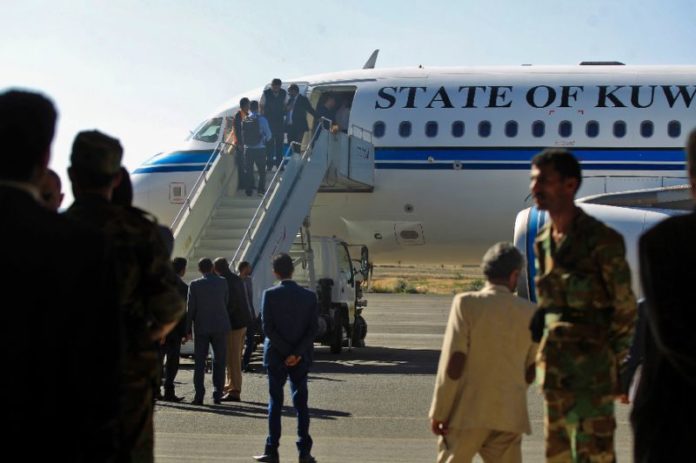DUBAI, Dec 5, 2018 (BSS/AFP) – The first Yemen peace talks since 2016 are
the best chance yet to end the war, analysts say, as the international
community throws its weight behind resolving the devastating conflict.
UN envoy Martin Griffiths flew out of the rebel-held capital Sanaa on
Tuesday with a delegation of Huthi insurgents, heading to Sweden for
negotiations with the Saudi-backed government.
The four-year-war between the Iran-aligned Huthi rebels and pro-government
forces has pushed the country to the brink of famine, with 14 million people
facing the threat of starvation according to the UN.
Footage of severely malnourished children, too weak to move, has grabbed
the world’s attention.
“What we have now is a window of opportunity — probably the best we have
seen in months — to finally get peace talks started,” said Elizabeth
Dickinson, senior analyst with the International Crisis Group.
Saudi Arabia, which leads a military coalition backing the Yemeni
government, is more inclined to accept calls to end the fighting amid
increased global pressure following the murder of journalist Jamal Khashoggi
in its Istanbul consulate.
But doubts remain as to whether external pressure is enough to bring both
sides to the table “in a serious way”, Dickinson told AFP.
– ‘Most opportune time’ –
UN Secretary General Antonio Guterres said last month that if the war can
be ended, “we will be stopping the most tragic humanitarian disaster we are
facing in today’s world.”
In September, peace talks faltered when the Huthis refused to travel to
Geneva, accusing the UN of failing to guarantee their delegation’s return to
Sanaa or secure the evacuation of wounded rebels to Oman.
Negotiations hosted by Kuwait in 2016 broke down after 108 days and left
rebel delegates stranded in Oman for three months.
In significant steps towards kickstarting talks in Sweden, 50 wounded
rebels were evacuated on Monday for treatment in Oman and a prisoner swap
deal was announced.
Neil Partrick, a specialist in Gulf Arab politics, said that now is “the
most opportune time to end the fighting” since the 2015 Saudi-led
intervention.
Saudi Arabia has been facing intense criticism over the murder of Saudi
citizen Khashoggi in October, which Riyadh said was a “rogue” operation.
The killing “has given the US and the UK the opportunity to try to nudge
the Saudis into being more serious about what an advantageous end to the
fighting might look like for them and their Yemeni allies,” Partrick told
AFP.
Britain last month presented a draft resolution to the UN Security Council
demanding a truce in Yemen, although the United States said a vote on the
measure should be put on hold until negotiations are held in Sweden.
Although international pressure on Riyadh may have paved the way for talks
and a temporary cessation of hostilities in the key port city of Hodeida,
Yemen specialist Franck Mermier cautioned challenges to peace remain.
“It will not force Saudi Arabia to stop the battles without significant
military gains on the ground,” said Mermier, an anthropologist at France’s
CNRS research centre.
The Huthis will meanwhile be unwilling to relinquish power “and their
concessions will be minimal,” he said.
– Collapsing economy –
The coalition’s six-month battle to seize Hodeida from the Huthis has been
largely suspended, but operations at the port — the entry point for the
majority of aid — have been reduced drastically according to the UN.
Yemen’s finances have been devastated by the conflict, with the World Bank
reporting the economy has contracted by around 50 percent since 2015.
Unemployment is running at over 30 percent and inflation is projected at
around 42 percent, while the majority of state employees are not paid.
“The situation is catastrophic and harsh… Revenues have dried up… and
the riyal’s value has deteriorated sharply,” Yemeni economist Ahmed Ghaleb
told AFP.
In Sanaa, people have been feeling the pinch for some time and are waiting
to see whether this round of negotiations will finally bring peace.
“All Yemenis hope for the success of the planned peace talks, but there is
a belief that they won’t be successful,” said resident Abdelrahman al-Bseir.
“If these talks are successful, then they would have been for Syria and
other (war-torn) countries,” he added.
In Aden, Khaled Fadel was more optimistic and hoped the negotiations would
prove successful.
“But they will (only) work if all parties offer concessions,” he said.



